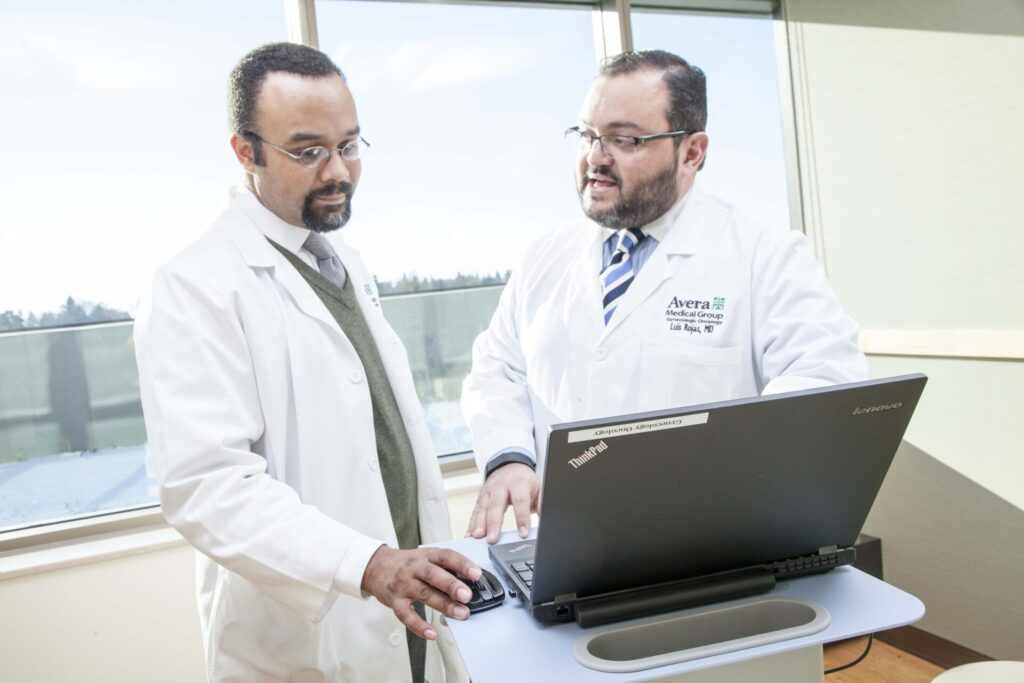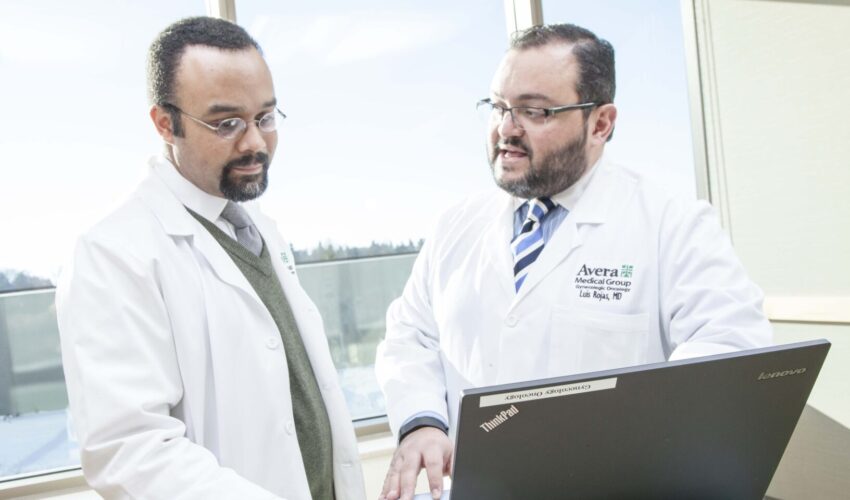For specialized cancer team, research gives patients options — and hope
March 22, 2023
This paid piece is sponsored by Avera Health.
For an oncologist, when the cancers you treat are rare and often advanced, you’re constantly seeking more options to benefit your patients and give them hope.
It’s why gynecologic oncology specialists Dr. Luis Rojas and Dr. David Starks have emphasized research ever since joining Avera, both having completed their specialty fellowships at Cleveland Clinic. Rojas joined Avera in 2007 and Starks in 2012. Now, the practice is on the search for a third physician.
“Between the expanding science and Avera becoming more standardized through our service lines across the regions we serve, we’ve been able to treat more patients and increase our volumes,” Rojas said.
Dr. David Starks and Dr. Luis Rojas with Avera Medical Group Gynecologic Oncology in Sioux Falls
At the Avera Cancer Institute in Sioux Falls, Rojas and Starks treat cancers of all female reproductive organs, including the cervix, ovaries and uterus or uterine lining. A unique characteristic of this practice is that the specialists provide multiple aspects of cancer care: surgery, chemotherapy, immunotherapy and clinical studies.
While rare, some gynecologic cancers, like ovarian, go undetected until they are in the later stages of the disease. The Pap test only screens for cervical cancer, and there isn’t a screening test for ovarian or uterine cancer. Symptoms often are vague.
That means many of the women referred to Rojas and Starks don’t have an easy solution to their cancer.
More options for cancer patients
“Our goal is to make sure our patients have as many options as possible,” Starks said. Standard of care is always provided to patients; participation in a clinical trial gives patients additional options, which may be the most cutting edge.
Starks and Rojas routinely have been involved in clinical trials sponsored by the National Cancer Institute and the pharmaceutical industry. They’ve served as principal investigators and authors for published research. They’ve presented sessions and posters at national conferences.
“We’re not doing research to rise up through the ranks of an academic center,” Starks said. “We’re doing this because there are newer drugs coming out — and some with substantial benefit — and our patients are getting to see those benefits two or three years earlier than they normally would through an FDA-approved treatment.”
One example is a study in which ovarian cancer patients take a pill called a PARP inhibitor before surgery to shrink the tumor. Avera is the first U.S. site to take part in this international study.
“We enrolled a patient who had a spectacular response,” Rojas said. The surgeons could see significant spread of cancer in a first laparoscopy done to determine if the cancer was operable. Yet in the follow-up surgery after the patient took the PARP inhibitor pill, there was no cancer visible to the surgeons.
Five years ago, the two colleagues never would have dreamed of giving a patient a pill before surgery to diminish the cancer. “Having seen that response, we are pretty excited to be able to offer this to our patients,” Starks said.
Rojas and Starks are quick to say that not everyone who takes part in a clinical trial experiences this type of outcome. Sometimes, a study is halted because patients are not benefiting. Or, adverse side effects aren’t worth the benefit. Patients receive all the information up front about potential risks and benefits of participating in a clinical study – and it’s their decision whether to move forward.
Another recent study involved patients with endometrial cancer taking standard chemotherapy plus immunotherapy. A substantial benefit of this three-drug combination recently was announced nationally.
Promise of cellular therapy
Gynecologic oncologists have joined with the Avera Medical Group Hematology, Transplant & Cellular Therapy team to offer cellular therapy through two new TIL, or tumor infiltrating lymphocytes, studies.
“Specialized white blood cells called T cells are collected from the patient then reprogrammed and reinfused to specifically target the cancer,” Rojas explained. “An ovarian TIL study is the first of its kind.”
“Here at Avera, we have the right infrastructure as a community medical center to offer these. We have the cellular therapy experts to collaborate with, and we hope we’ll see success and be able to bring in cellular therapy for other tumor types such as lung and melanoma,” he said.
Starks and Rojas also have been involved with genomics or precision oncology, in which the tumor is genetically sequenced to discover how cells have mutated and what chemotherapies might work best.
“We’ve had patients who were previously running out of options for successful treatment have complete responses, with no evidence of disease and living way beyond the life expectancy for the extent of their disease,” Starks said.
In the past, gynecologic oncology as a research field was a bit “sleepy,” Starks said.
“In the last few years, there’s been an explosion of new trials, new drugs and new opportunities,” he said. “We got in on that as it was starting to occur, and we’ve been riding that wave. We’ve seen the benefits, and that keeps our excitement going, so we’re trying to push what we can do.”
“It’s not only us,” Rojas added. “We have people at Avera like our research implementation team, research pharmacists team and research thinkers like Casey Williams, PharmD, who constantly push us to think above and beyond the standard therapies for the benefit of patients.”
Learn more about cancer care at Avera.








